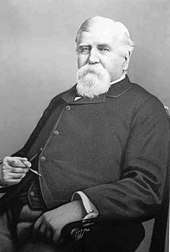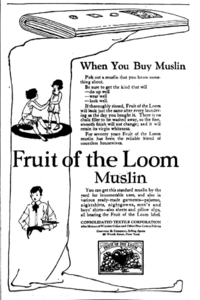Fruit of the Loom
Fruit of the Loom is an American company that manufactures clothing, particularly underwear and sports equipment. The company's world headquarters is in Bowling Green, Kentucky. Since 2002 it has been a subsidiary of Berkshire Hathaway.
 | |
 Company headquarters building in Bowling Green, Kentucky | |
| Private company [1] | |
| Industry | Textile, Sport |
| Founded | 1851 in Warwick, Rhode Island, U.S. (as "B.B and R Knight Corp.)[1] |
| Founder | Robert Knight & Benjamin Knight [2] |
| Headquarters | , |
Area served | Worldwide |
| Products | Clothing, Underwear, Sports equipment |
Number of employees | 32,400 |
| Parent | Berkshire Hathaway (since 2002) |
| Subsidiaries | List
|
| Website | fotlinc |
Company profile
Fruit of the Loom is one of the largest manufacturers and marketers of men's and boys' underwear, women's and girls' underwear, printable T-shirts and fleece for the activewear industry, casualwear, women's jeanswear, and childrenswear. The company employs more than 32,400 people worldwide.
Fruit of the Loom also controls the underwear brand, B.V.D. (Bradley, Voorhees, and Day). Other brands also manufactured and sold by the company are Funpals/FunGals, Screen Stars, and Underoos. Brands once owned or marketed by Fruit of the Loom include Gitano, Munsingwear, Salem Sportswear, and Pro Player, which once had the naming rights to what is now Hard Rock Stadium (originally Joe Robbie Stadium) in Miami Gardens, Florida, from 1996 to 2005, despite bankruptcy by the parent company in 1999.
The company's logo comprising a red apple, leaves, green grapes, currants, and purple grapes forms a widely recognizable trademark. The company is a vertically integrated manufacturer. In 2006, Fruit of the Loom acquired Russell Brands, LLC, a global company whose brands included Russell Athletic, Brooks Running, and Spalding, among other names in athletic wear.[3] The purchase amount was $600 million.[4]
History
Rhode Island beginnings

The origin of the Fruit of the Loom company dates back to 1851 in Rhode Island,[5][6] when textile mill owner Robert Knight and his brother Benjamin established the "B.B. and R. Knight Corporation" after they acquired the Pontiac Mill in Warwick, Rhode Island. In 1856, the company changed its name to "Fruit of the Loom", while producing its first muslins.[2]

A friend of Robert Knight named Rufus Skeel owned a small shop in Providence that sold cloth from Knight's mill. Skeel's daughter painted images of apples and applied them to the bolts of cloth. The ones with the apple emblems proved most popular. Knight thought the labels would be the perfect symbol for his trade name, Fruit of the Loom – an expression referring to clothes, paralleling the phrase "fruit of the womb" meaning "children", which can be traced back to the Bible (Psalm 127:3).[7]
In 1871, just one year after the first trademark laws were passed by Congress, Knight received trademark number 418 for the brand "Fruit of the Loom". Much of its athletic outerwear was sold under the "Pro Player" label, a now defunct division.
20th century
The company was part of Northwest Industries, Inc., until NWI was purchased by William F. Farley in 1985 and renamed Farley Industries, Inc.[8]
Farley served as president, CEO, and majority shareholder for 15 years. Fruit of the Loom's sales revenue rose from approximately $500 million at the time of NWI's purchase to roughly $2.5 billion nearly 15 years later. Debt financing proved difficult to manage even as sales revenue quintupled. On March 23, 1987, it sold its subsidiary General Battery to Exide Corporation.[9]
The 1990s saw widespread downsizing of the American textile industry overall in the wake of North American Free Trade Agreement and General Agreement on Tariffs and Trade.[10] In 1995 Chairman Farley announced that the company would close six plants in the Southeastern United States, and cut back operations at two others.[10] Operations were moved to cheaper plants abroad. 3,200 workers, or about 12 percent of its American work force, were laid off.[10] Farley also announced that company earnings fell 22 percent, despite a 10 percent increase in sales.[10]
Fruit of the Loom filed for Chapter 11 bankruptcy protection in 1999 shortly after posting a net loss of $576.2 million.[11] Its 66 million shares of outstanding common stock dropped in value from about $44 per share in early 1997 to just more than $1 by spring 2000. Reasons for the bankruptcy are varied. A large debt load which was assumed in the 1980s, a common practice at the time, did not help. William F. "Bill" Farley, the company's former chairman, CEO, and COO, was ousted prior to the bankruptcy filing in late 1999, after having piloted the company into massive debt and unproductive business ventures, including structuring the company into an off-shore entity in the Cayman Islands to avoid taxes.
21st century
The company was bought from bankruptcy by Berkshire Hathaway Corporation, controlled by investor Warren Buffett, who wanted the valuable brand. He agreed in January 2002 to purchase the company for approximately $835 million in cash. The deal was concluded on April 29, 2002. A condition of the purchase required that former COO and then interim CEO John Holland remain available to be the CEO for the company.[12]
The company purchased Russell Brands, LLC, effectively taking the former competitor private, in a deal valued at $598.3 million that was completed August 1, 2006.[13]
The company announced the purchase of VF Corporation's intimate apparel company named Vanity Fair Intimates for $350 million in cash on January 23, 2007.[14] This company was renamed Vanity Fair Brands and is operated as a wholly owned subsidiary.[15]
In 2010, Rick Medlin was named president and CEO of Fruit of the Loom. Longtime CEO John Holland became the company's chairman.[16] In 2014, the company closed its Jamestown, Kentucky, plant, which had once been the second manufacturing plant in the state, and laid off all 600 employees.[17] The company acknowledged it was moving the plant's operations to Honduras to reduce production costs.[18]
In December 2016, Melissa Burgess Taylor was named chairman and CEO of Fruit of the Loom by Buffett after the death of Rick Medlin.[19]
Brands
The list of brands owned by Fruit of the Loom includes mostly clothing manufacturers, focused on lingerie (Best Form, Curvation, Exquisite Form, Lily of France, Vanity Fair, Vassarette). Brands products also include casual apparel (Jerzees, Russell Athletic), and sports equipment (through American Athletic Inc. for gymnastics apparatus) and balls manufacturers Dudley and Spalding that produce softballs and basketballs respectively.
In popular culture
The Fruit of the Loom logo is often mistakenly believed to have or historically have had a cornucopia within it, however this has never been the case.[20] This collective false memory has been prominently featured as an alleged example of the so called "Mandela Effect", a viral Internet phenomenon that first emerged in the early 2010s. [21] [22]
References
- Company Overview of Fruit of the Loom, Inc. on Bloomberg.com
- History and more on FOTL website
- Acquisition of Russell Corporation Complete on Business Wire
- Russell Corporation history in "Reference for Business" website
- "Fruit of the Loom". fotlinc.com. Retrieved June 10, 2016.
- Rhodes, Margaret (March 24, 2014). "Why Fruit Of The Loom Is Designing More Than Just Undies". Fast Co Design. Retrieved June 10, 2016.
- "Psalm 127:3". YouVersion. YouVersion. Retrieved 29 August 2018.
Lo, children are an heritage of the Lord : and the fruit of the womb is his reward.
- Northwest Industries Inc., The Electronic Encyclopedia of Chicago, 2005, Chicago Historical Society; accessed April 6, 2018.
- https://www.nytimes.com/1987/03/24/business/company-news-fruit-of-the-loom.html company-news-fruit-of-the-loom.html
- Feder, Barnaby (31 October 1995). "Fruit of the Loom to Close Six U.S. Plants". The New York Times. p. D6. Retrieved 29 April 2018.
- "Fruit of the Loom Files for Chapter 11". Los Angeles Times. December 30, 1999. Retrieved June 10, 2016.
- Buffett, Warren (February 28, 2002). "Chairman's letter". Berkshire Hathaway. Retrieved January 23, 2007.
- "Berkshire agrees to buy Russell for $598.3M in cash". MarketWatch. April 17, 2006. Retrieved June 10, 2016.
- "VF Corp. sells intimate apparel unit to Fruit of the Loom". MarketWatch. January 23, 2007. Archived from the original on July 7, 2012. Retrieved January 23, 2007.
- "Perceva offers to buy Berkshire Hathaway's lingerie brands".
- Maze, Brent (August 10, 2010). "New CEO to lead Fruit". AlexCityOutlook.com. Retrieved May 31, 2013.
- Estep, Bill (March 21, 2015). "Jobs gone, Fruit of the Loom's unpaid property tax bill remains in Russell County". Lexington Herald Leader. Retrieved September 20, 2016.
- Beam, Adam (April 3, 2014). "Fruit of the Loom to close U.S. plant, move jobs to Honduras". St. Louis Post Dispatch. Associated Press. Retrieved September 20, 2016.
- "Fruit of The Loom News". fotlinc.com. Retrieved 2018-03-13.
- https://www.fruit.com/page?cid=fruit-story
- https://ruinmyweek.com/weird/mandela-effect-fruit-of-the-loom-logo-cornucopia/
- https://www.snopes.com/news/2016/07/24/the-mandela-effect/
External links
| Wikimedia Commons has media related to Fruit of the Loom. |
- Official website
- Wholesale Fruit of the Loom
- The Fruit of the Loom Guys Creator, costumers.com
- Farley looks for Congressional help November 1, 1999.
- Berkshire Hathaway Announcement of Fruit of the Loom Acquisition, berkshirehathaway.com, April 30, 2002.
- Buffett's Berkshire to buy Russell, cnn.com, April 17, 2006.